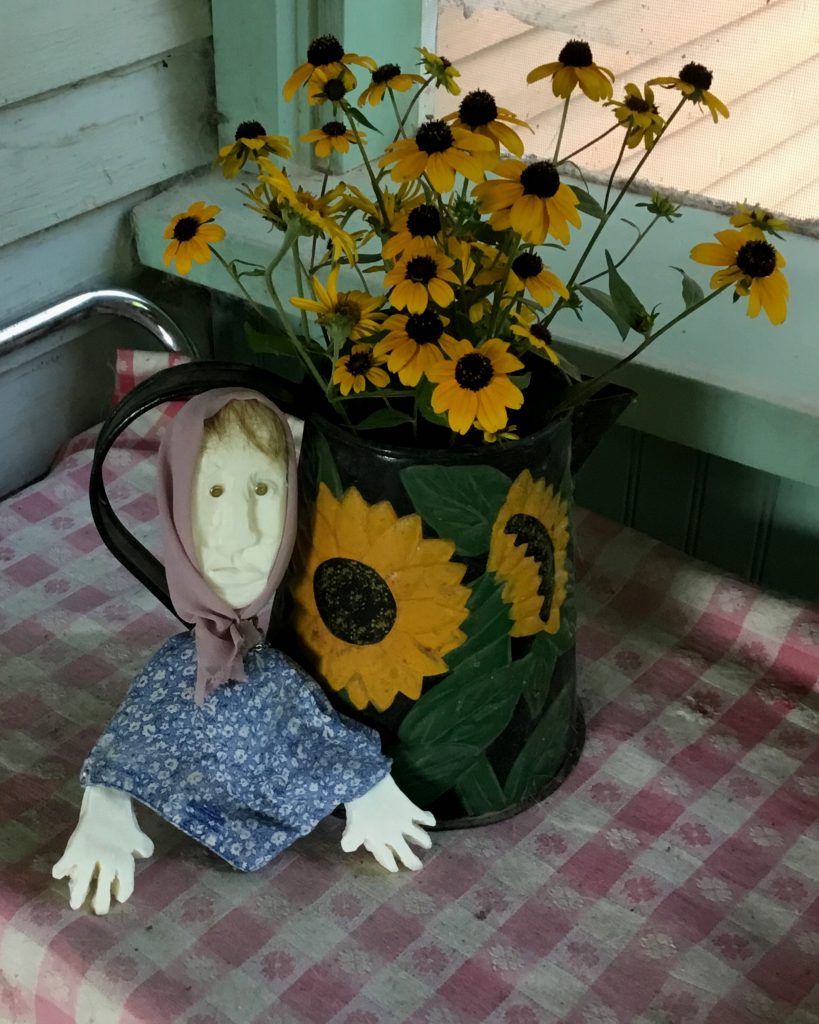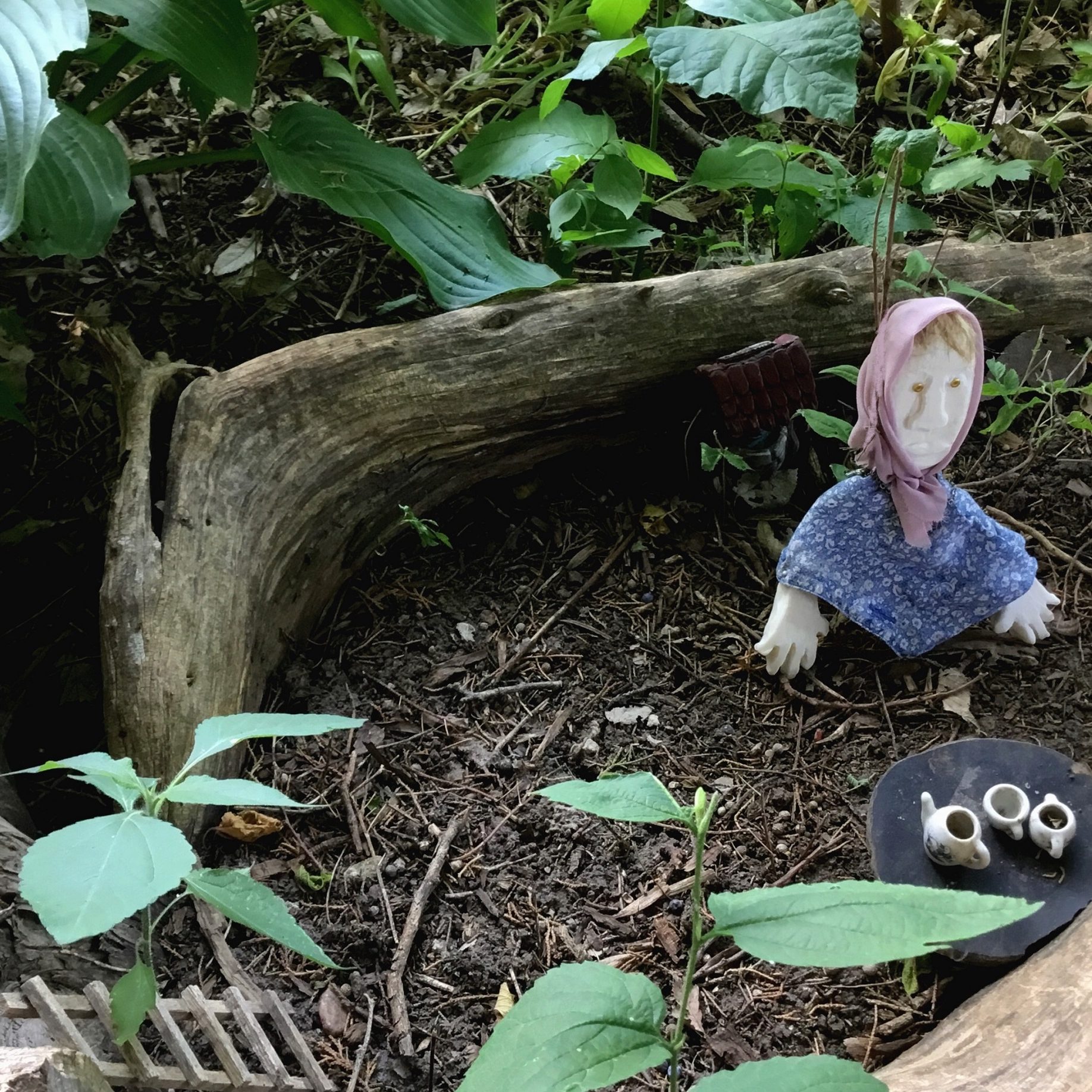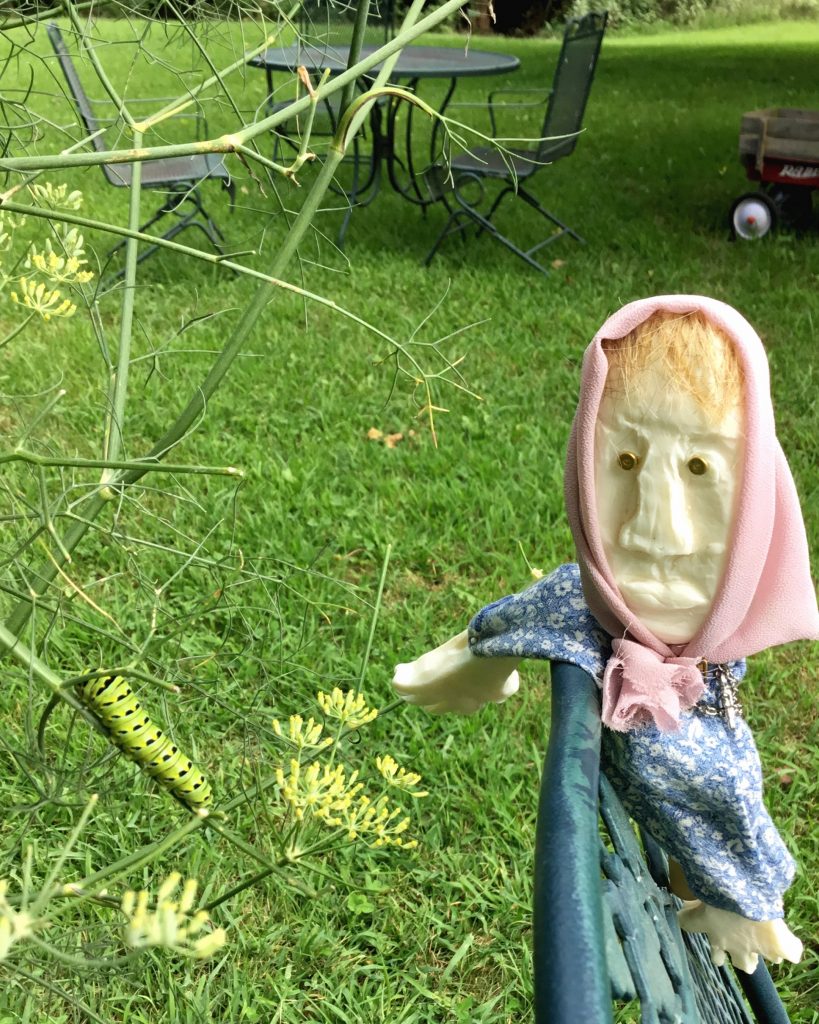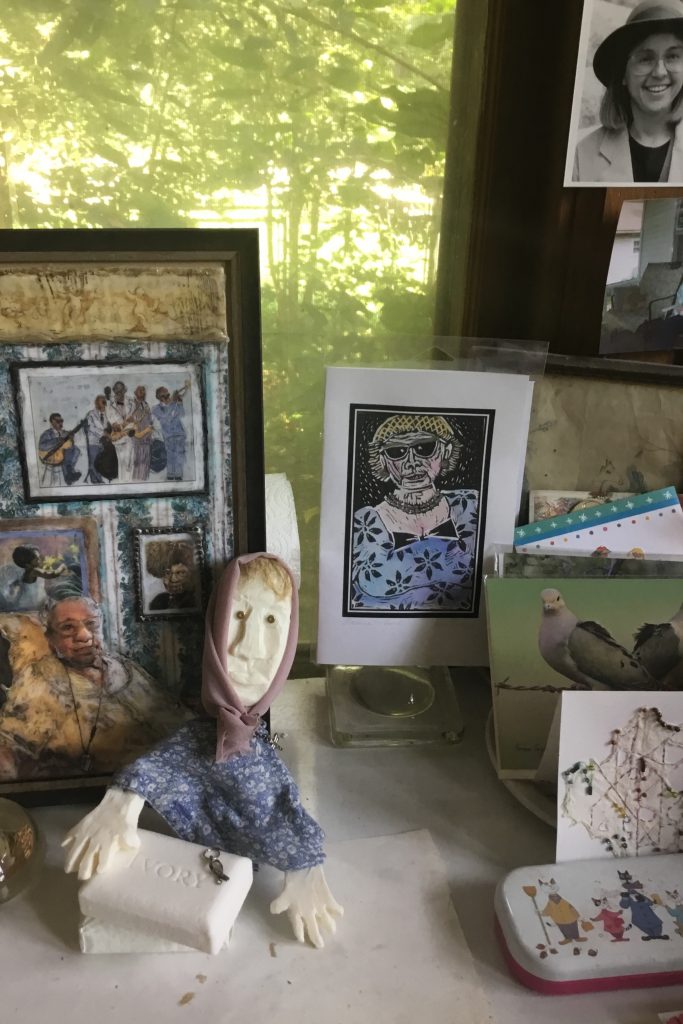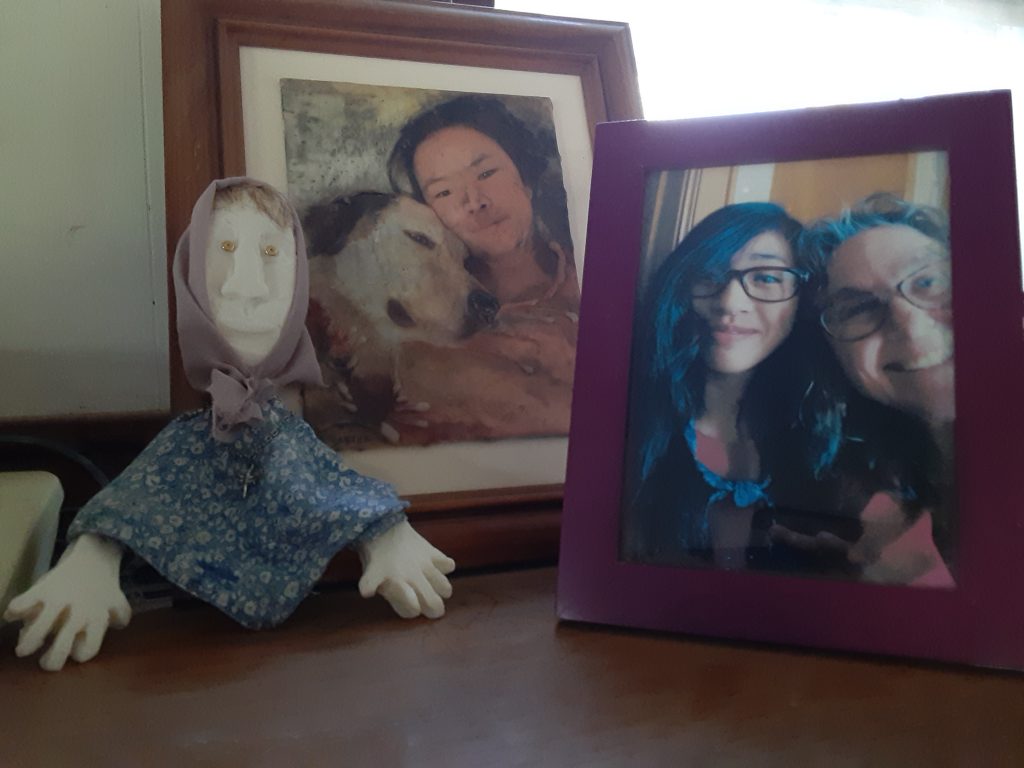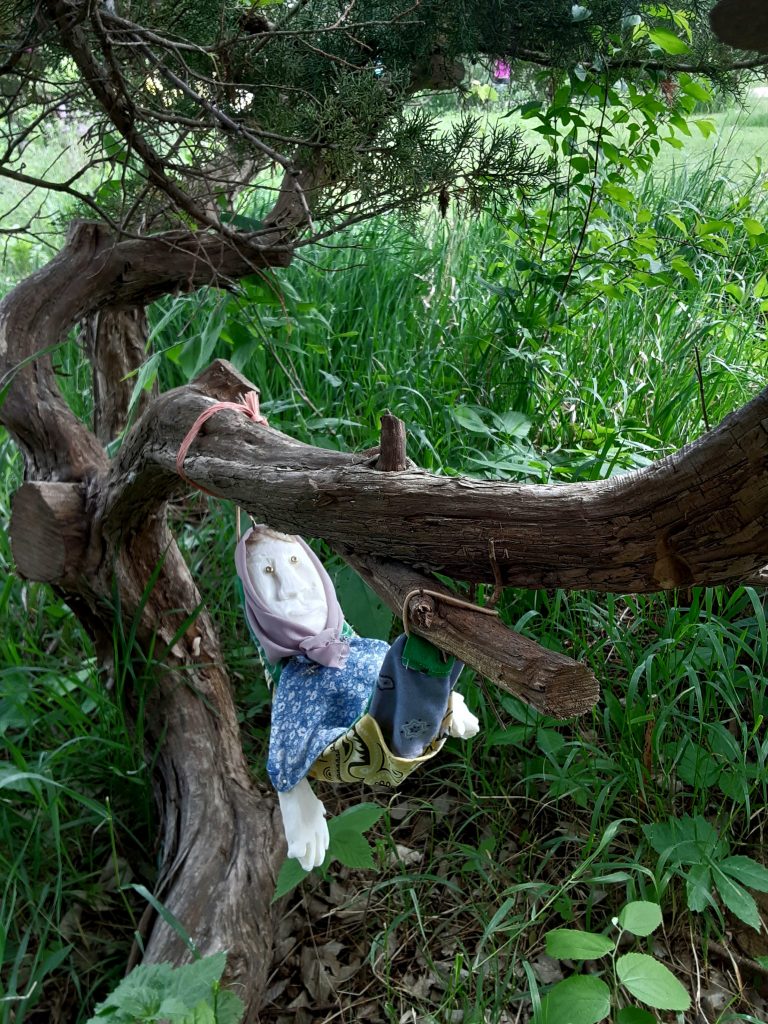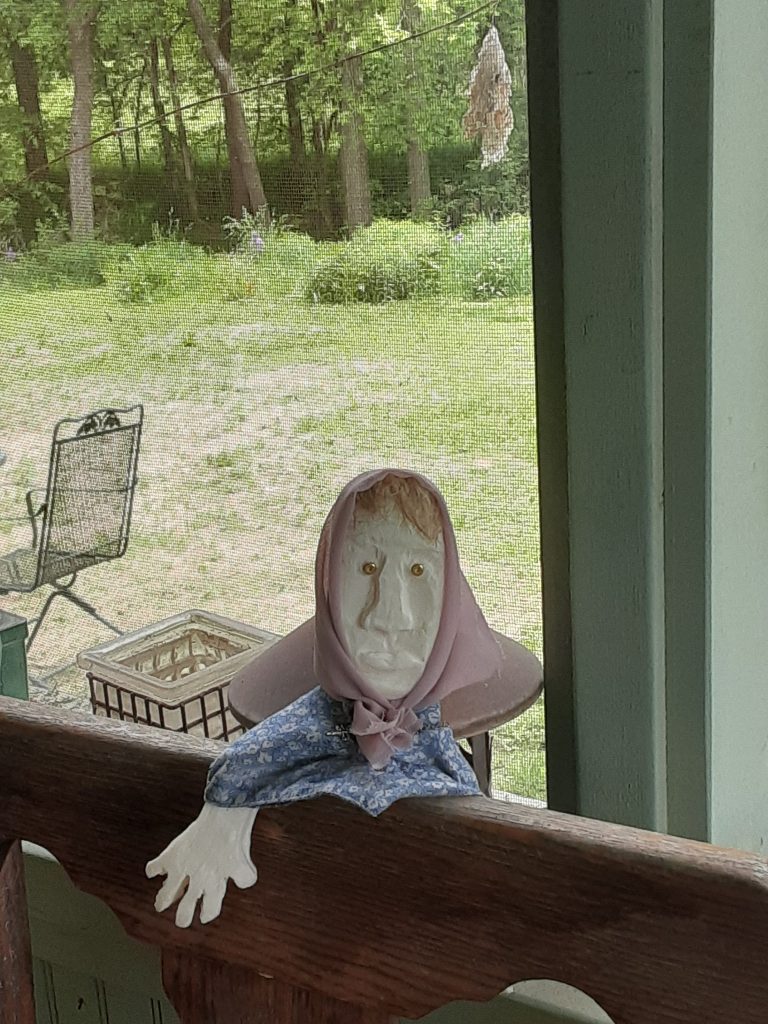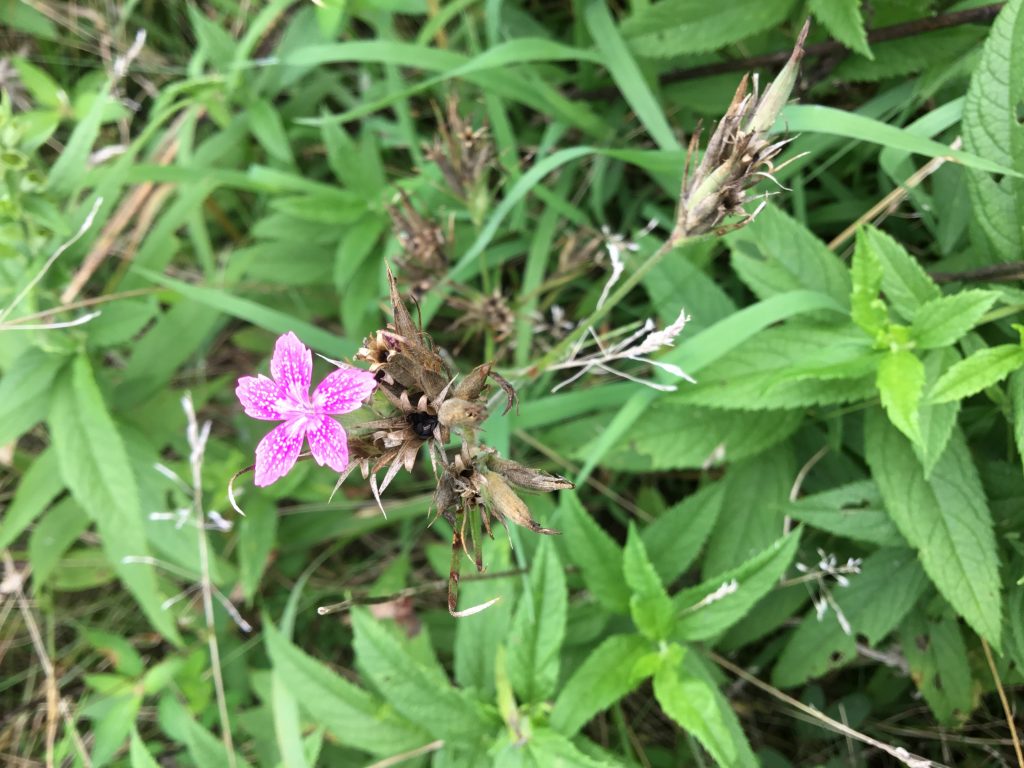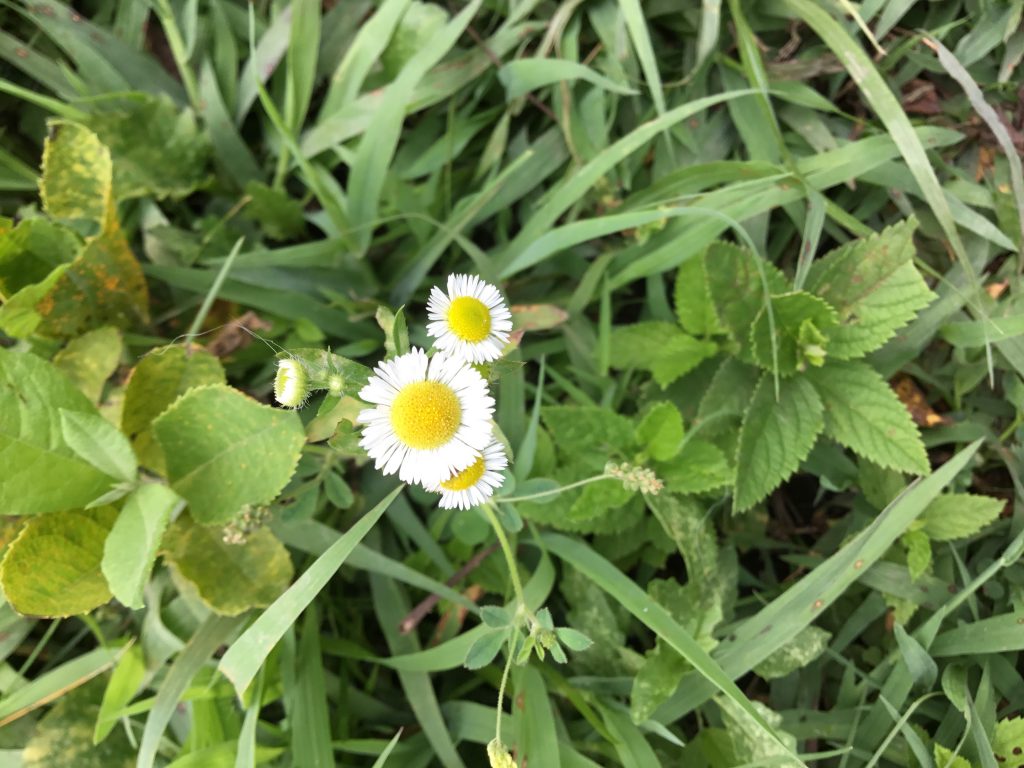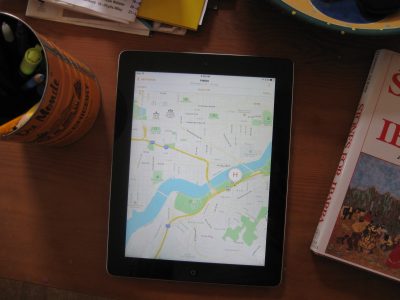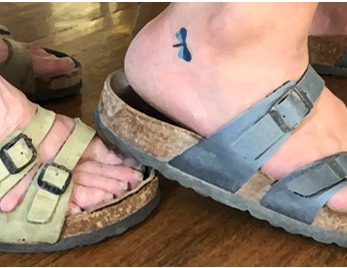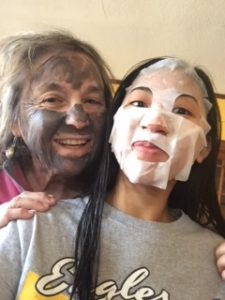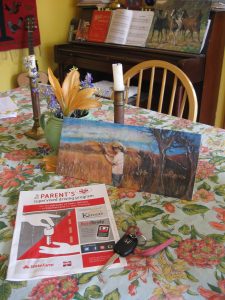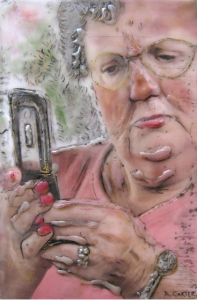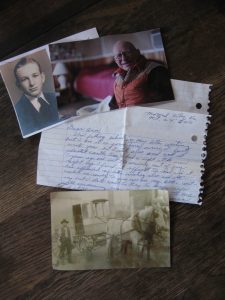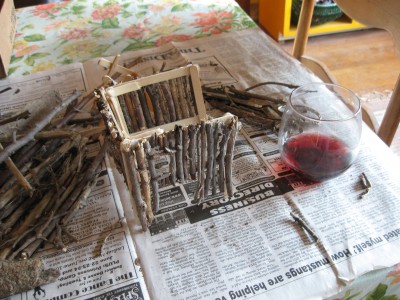Rose left for New York City Friday. It’s quite a jump from our Manhattan, Kansas “Little Apple” to the “Big Apple” and a bit scary, for both of us. She went with other high school students to see Broadway shows, tour the sights of the city, and go to seminars on human trafficking–all part of a church trip. On the drive to Topeka to connect with her ride to the K.C. airport, I heard Rose question why she thought she wanted to do this trip, why six months before it had seemed like such a good idea, why she wanted to be so far away from all that was familiar.
Home by myself (aside from all the dogs and cats) I took out a notebook I put together after my own trip to NYC, complete with my design for a New Yorker magazine cover.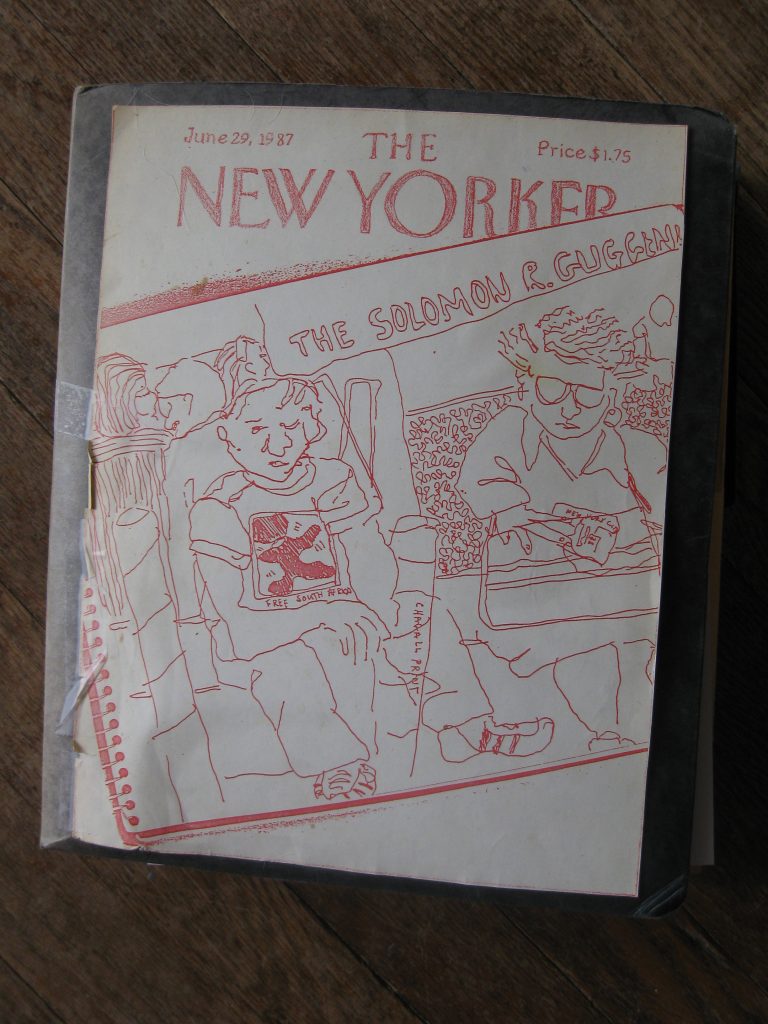
I was older than Rose, in my mid thirties, and traveling with a group of art faculty and students from K-State. Two of my favorite teachers and mentors, Jack and Terri, were going and a younger friend and undergraduate art student, Mike.
First the first time in years, I reread the book, put together with journal entries and sketches made during the trip, along with postcards and brochures.
Thursday, June 11, 1987
We leave Manhattan early and find out in the car that no one has gotten more than three hours sleep. We stop for juice and coffee and then start to wonder if we’ve allowed enough time—Terri tells Mike to “spin leather”. On the plane I start to relax and look across to Mike, who has never been out of the Midwest, never seen the ocean. I remember the trip I took at twenty-one to Paris, with many firsts like him. As we start to get close to New York, I feel foolishly frightened. I feel like I have never traveled before and wonder why I wanted to spend so much money on this trip. I feel again a little like I felt at twenty-one.
After landing and getting our luggage we get into two taxis. Our driver is friendly but can only identify two buildings on the Manhattan skyline. “That’s the Chrysler Building and that the Empire State Building,” he says again and again. He dodges in and out of traffic at what seems like a reckless speed as Jack tries to get more information from him and Terri squeezes my hand.
We unpack in the tiny rooms with bunk beds and views of pipes and walls and set out walking and suddenly I realize that this is just a city of people and not so unlike Sydney. The subway station smells of urine, but the cars are clean and filled with posters advertising cosmetics, roach control, birth control, the dangers of drugs, and even tolerance to AIDS victims. Lunch is a hot dog from a sidewalk stand near the Serra Wall. I find the idea of the wall interesting but the color and texture dull. We leave it to spend the rest of the day walking—halfway across the Brooklyn Bridge, through the crowded sidewalks of the Wall Street District, and down to Battery Park, where mothers push baby carriages by the water. I feel that I have seen this view in a dozen movies. We walk up to Chinatown where we have a so-s- dinner and then walk and walk and walk. It seems that in one day we have already seen half of Manhattan.
Friday, June 12, 1987
At the Whitney at the Equitable Center we see late de kooning (boring) and early Stuart Davis “New Mexican landscape” with subdued color, and a beautiful Alexander Calder—something different and early—a cat in wood. This is the first of many Calders I will see in N.Y. and with most I am very impressed. This wood carving is perhaps my favorite piece here in this museum.
The Barry Flanagan sculptures are something I could look at for hours—the 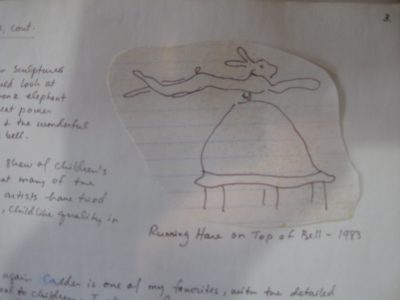 bronze elephant with the sense of great power in the legs and trunk and the wonderful hare on top of the bell.
bronze elephant with the sense of great power in the legs and trunk and the wonderful hare on top of the bell.
I also enjoy the show of children’s work and recognize that many of the great contemporary artists have tried to capture the same childlike quality in their work.
At the Whitney, again Calder is one of my favorites, with the detailed circus figures and appeal to children. I also am fascinated by the tiny Mexican structure by Charles Simonds and think of being in the 5th grade and making tiny little villages out of pebbles and twigs during recess. I like things that bring back childhood memories.
Saturday, June 13, 1987
Caught a taxi down to the Staten Island Ferry Station. Had to run to get the ferry and got on free because I couldn’t find change and the booth lady let me in. We got over and missed the next one back. The “girls” sat and ate and chatted while the “boys” pitched pennies against the wall with some locals—a highlight for Jack after he’d made “a trip to hell” by using the public toilet. But the trip back was my highlight—standing at the front of the boat, the cool night wind blowing, and watching the Manhattan lit skyline get bigger and bigger. We walked and walked, often lost, in lower Manhattan, with almost no one in sight, steam coming up from subway holes, and I felt I was in some futuristic movie, expecting to see gangs with chains at any moment.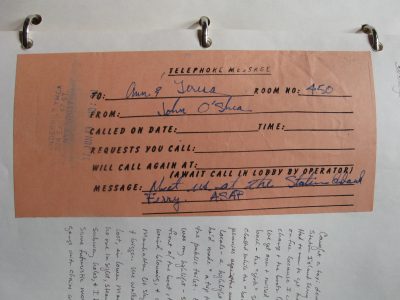
Sunday, June 14, 1987
After a deli breakfast of bagels and cream cheese, Terri, Mike and I go to St. Bartholomew’s Episcopal Church—rather a high-class church and likely with wealthy people in the congregation. The minister was celebrating his anniversary there (15 years?) and spoke about what a minister needs—compassion, to make himself present and vulnerable, to speak out. He talked about how the church was involved in housing for the homeless and AIDS and how there was always some resistance. The music was beautiful and being there peaceful.
We walked all over. The Strand Bookstore was closed and we couldn’t find the Art Cinema. Walked through the Bowery—lots of men sitting around. Earlier we had a beer at a famous old speakeasy. Interesting graffiti on the bathroom wall—something about life being like a penis, but now I can’t remember all of it.
Monday June 15, 1987
The waterfall at the Olympic Tower was cool and inviting on such a hot, humid day. I pitched a quarter in. On to the Museum of Modern Art (MOMA). 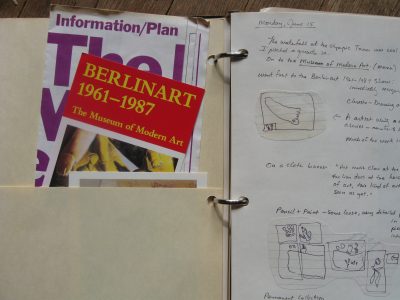
Degas’ “At the Milliner’s”, a pastel with such richness of color, in the same room with Van Gogh’s “The starry Night”. As Jack said out in the sculpture garden, “It’s an overload—I had to take a break.”
Matisse’s sculpture “The Serf” in bronze and next to it “Male Model”. These two pieces seem to go together—they are so human. They could be any man, but remind you of a certain man, so sympathetic and loving is the description.
Almost ran through contemporary section—by 3:30 I’ve had enough! Got caught in rain, letter waiting, almost feels like I’ve been here a month and plan to stay a month longer. Long nap then dinner with Mike and Terri at an Italian/Greek place three blocks away.
Tuesday, June 16, 1987
Soho Galleries.
“Art Against AIDS” pieces in many galleries. Sign over gallery: Put food out in the same place every day and talk to the people who come to eat and organize them.
Leo Castelli—he was being interviewed and videotaped in back room of gallery while we were there. Two new Stella pieces. Big business. I think of value and what it is. Is this stuff really that much more valuable than things that bring $100? What is success? How would it really feel to have a big name?
2:30—We lose Jack and the rest of the day keep an eye out for someone with a fast walk and an Art for AIDS bag.
Wednesday, June 17, 1987
A man tried to pickpocket me while getting on a bus this morning. The steps are crowded and when I look down, he has his hand in my purse. I’m too shocked to say anything—I just look at him. His hand comes out, he looks up at the driver and says, “Is this the No. 5 bus?” and is quickly gone. I don’t feel frightened at all. His face is harmless and not mean. He’s doing his job and this time has failed.
The Metropolitan Museum of Art Balthus–“Nude in Front of a Mantel”–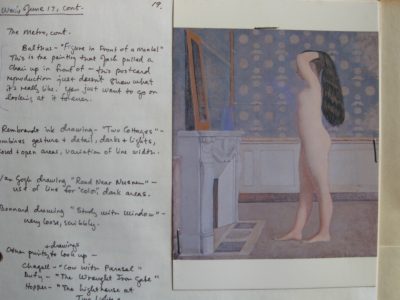 this is the painting that Jack pulled a chair up in front of–this postcard reproduction just doesn’t show what it’s really like. You just want to go on looking at it forever.
this is the painting that Jack pulled a chair up in front of–this postcard reproduction just doesn’t show what it’s really like. You just want to go on looking at it forever.
We approach the Rembrandt room in the Metropolitan Museum of Art and Terri is ahead. Suddenly she starts running from painting to painting. She runs to the door, her tongue sticking out and arms waving, “Mike, Ann, Rembrandt!” and then dashes back. She calls his surfaces “buttery”. There is “Self Portrait” with so much subtle variation of color in the face, “Lady with a Pink….” very dark but very rich background, “Aristotle with a Bust of Homer” with wonderful texture. I somehow think that Terri never completely recovers from this room. And for the rest of the trip we notice that whenever anything excites her, her tongue comes way out and her arms start to wave.
We wander around Lincoln Center, eat fish and chips at an “expensive cheap” place and then walk to the Plaza Hotel—a place full of elegance and wealth and again I feel a desire to be part of all this. I feel the conflict of respecting and liking the idea of a simple life with few possessions and yet am also drawn to this life of success and the good taste that money can buy. We walk some more and come across a group of white jazz musicians playing on the street, and they’re good, but then a black group sets up across the street and they really get going. We cross and listen and soon a large crowd is gathered around listening to “The Heavenly Hummingbirds.” Their 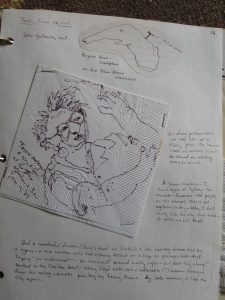 instruments duck and sway as they do and the music gets better and better and I feel that this is the very best that New York City has to offer—to walk down the street at night and happen on to music like this. A large, older man with a little white dog stops in front of Terri and does a little jig. We walk on and get our picture taken in front of a stand-up life size picture of Reagan, then on to Rockefeller Center, where a bum is told that he must sit up or move on, though told politely. He argues, then sits up, then moves on. It is a city of extremes.
instruments duck and sway as they do and the music gets better and better and I feel that this is the very best that New York City has to offer—to walk down the street at night and happen on to music like this. A large, older man with a little white dog stops in front of Terri and does a little jig. We walk on and get our picture taken in front of a stand-up life size picture of Reagan, then on to Rockefeller Center, where a bum is told that he must sit up or move on, though told politely. He argues, then sits up, then moves on. It is a city of extremes.
Thursday, June 18, 1987
Thompson Square, 3:30. We are back at the same park where we were this morning but now it is more alive. Lots of old men sitting around and people sleeping on benches. We walk past a food line with gospel music playing from a nearby stand and a big sign that says, “Get High on Life”—perhaps a church line. The men seem friendly and are quietly waiting and many (most?) are young. I want to take a picture but am embarrassed. They seem to have a lot of dignity and I don’t know if my camera would take some of that away from them. We later talk to “Big Bob” and give him money for “the Vietnam Vets”. I silently hope he uses it to have a nice meal.
We have beer and bagels at a nice deli, see a transvestite with blue hair, go to the top of the Empire State Building and have a beautiful view. At dinner we all talk about learning about sex as children and talk too loudly. An older couple nearby keeps looking at us.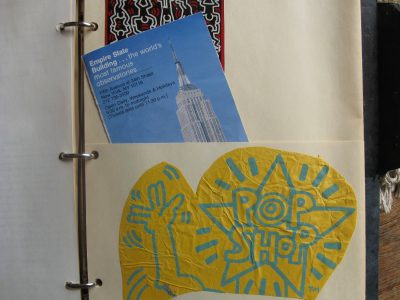
Friday, June 19, 1987
The Guggenheim
Some titles:
“A Drop of Dew Falling from the Wing awakening Rosalie Asleep in the shadow of a Cobweb”
“Hair Pursued by Two Planets”
On the second floor, a show by Mexican photographer Manuel Alvarez-Bravo. At beginning of show: “The photographer’s absorption with poor Mexico involves no propaganda or sentimentality, however. His peasants sleeping are neither victims nor comic stereotypes but dreamers, suggesting how poetry is made by everyone.”
Later we go to a country western bar on Second Ave.—a strange thing to see in the middle of Manhattan. But the music is good and everyone seems to be having fun. We leave but I insist we stay for one more song, “You were always on my mind”.
Saturday, June 20, 1987 (free day)
I sleep late and Terri, Mike and I eat breakfast at a place where a nice, shy man listens to our orders (all are different) without writing anything down, then brings the wrong food (the same for everyone). We eat is anyway, it tastes good, and we leave a big tip. We stroll (no fast Jack to follow) up to 57th St., stopping in a few shops but buying nothing but postcards.
Sunday, June 21, 1987
The Brooklyn Museum
The Botanical Gardens next to the museum are wonderful—lanes with overhanging trees, a rose garden with endless shades of reds and pinks, a Japanese pond, and a mother duck with a string of ducklings that look like pull toys.
Jack and I see a good off Broadway show, “Rosencrantz and Guildenstern are Dead” (Tom Stoppard)—excellent acting and it seems that this is most important here, unlike the Broadway show. We later walk though Chelsea, a very pleasant residential area, and see a tall woman in a long black coat, with black hair, walking three white dogs.
Monday, June 22, 1987 (free day)
We shop at Macy’s where it seems that there are endless racks of clothes on sale. It’s raining and we run to a coffee shop across the street for lunch, the get a subway to Coney Island. We don’t pass much of beauty or interest in Brooklyn except a huge graveyard–the headstones very close together and going on and on. I draw a woman sitting across from me who’s fallen asleep.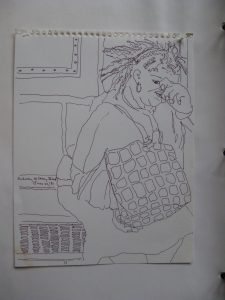
Coney Island is sadly rundown, dirty, and cheap looking, but because it is cloudy and cool the beach is uncrowded—in fact almost nobody. We walk along it and it’s still beautiful—it’s hard to spoil an ocean. We meet an old man who is from the Polar Bear Club and he asks us about the Prairie Grass National Park and the farmers in Kansas. Then he talks about the women in his retirement home and how, during the last election, they quoted from the Bible to show that Reagan should be voted for. “Just hear the authority is his voice,” they said. The Polar Bear man shakes his head as he talks about this. “And those people vote!” he says. “There should be a test they have to take first and then only get a percentage of a vote if they’re not smart enough.” As we leave he is wading back into the water, after telling us that in winter his swimming trunks freeze on him when he gets out of the “brine”. Soon after that a girl is pulled from the water but is revived. We are too far away to see much.
We treat Jack to dinner at “Mimi’s” and he gives out funny masks. We walk to Michael’s Pub, where Woody Allen sometimes plays, and look in the window—it looks very upper class. We walk some more and come upon the sky tram to Roosevelt Island. We take it, swinging out over the river. We stop for one last drink in New York City and go back to pack.
Tuesday, June 23, 1987
We sit in the coffee shop one last time and I wonder if our waiter will miss us. Every day he has smiled when we arrived and when we left. Somehow again we are rushed and the rest of the group scramble into two taxi cabs, worried they’ll miss their plane. I take a taxi to Penn Station, where the air conditioner must be broken and the signs are confusing. I am very relieved to get my ticket and realize I don’t want to stay here alone. The stairs to the tracks are too crowded and I imagine falling and being crushed. I look around and am amazed at how calm a couple carrying three small children are. My suitcase has become very heavy with books and a man with a backpack carries it on the train for me. I assume he’s looking for company but he then walks to another car with a boy, probably his son, and I feel guilty for not sensing he just wanted to help me. I check for the 10th time that I have everything as the train pulls out. It is not long before we are out of Manhattan and nothing looks familiar—the buildings are too low and too far apart. I think about what the sky tram operator said to Terry last night when she asked him if he liked living in New York. “I love this city,” he told her. “It grips you by the throat and you know you’re alive.”
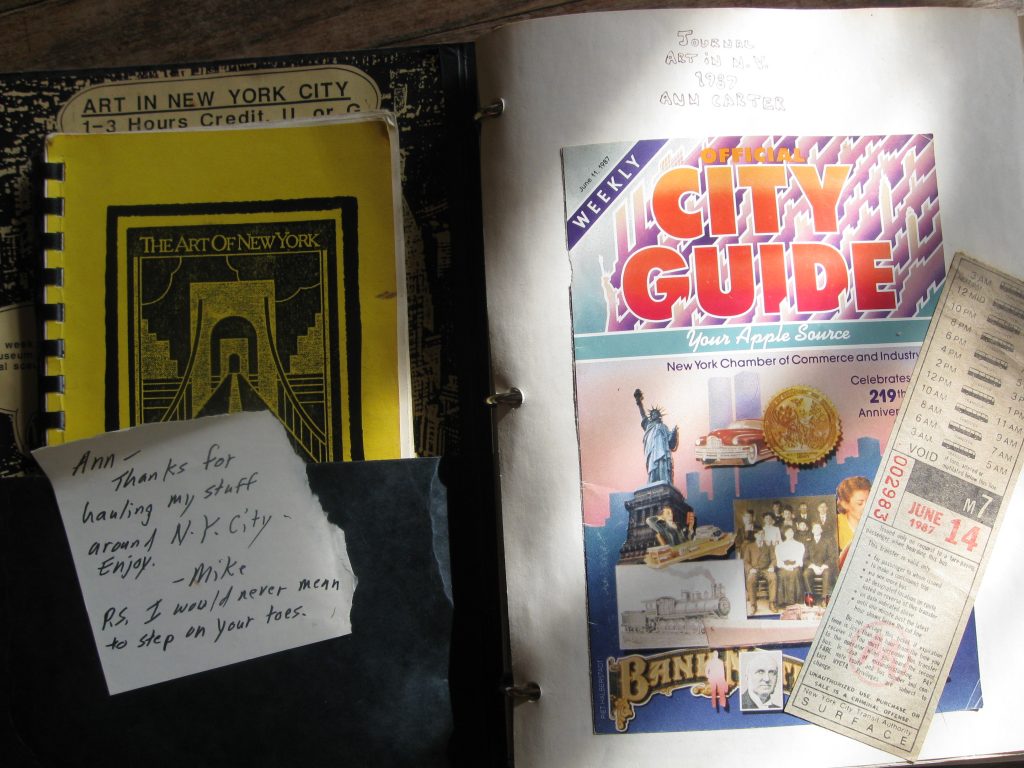
Before Rose got on the plane to go to New York I sent her a text:
I love you. And so glad you have a chance to have this adventure. I wouldn’t give up my adventures for anything. And often the things that are the hardest to do have the biggest rewards.
Rose has sent some texts back from the Big Apple though not as frequently or as detailed as I’d like. That’s okay as she’s having a great time and finding the city as fascinating as I did 31 years ago. I hope her life is full of things that make her know she’s alive. And I hope she remembers that there’s a lot to be learned from the people she may meet on the street, or in the sky swinging out over the East River. I certainly have.

